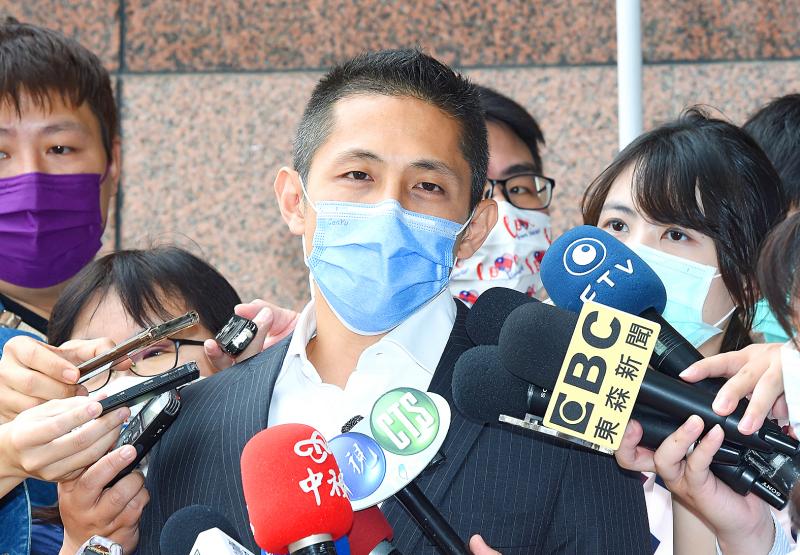In a bid to prevent people affiliated with criminal gangs from joining the party, Democratic Progressive Party (DPP) Taipei chapter head Enoch Wu (吳怡農) yesterday proposed a set of “reform measures.”
“This is the only way forward for our party to make progress in politics with democratic values,” Wu told a convention of chapter heads that was led by President Tsai Ing-wen (蔡英文), who is the DPP chairperson. “The DPP must not betray the trust of its members, so I am asking chapter heads to push for and to implement these policies.”
The meeting was called in response to allegations that Chao Chieh-yu (趙介佑) was involved in racketeering, assault and kidnapping related to organized crime. Chao was expelled from the party this week after the allegations came to light.

Photo: Liao Chen-huei, Taipei Times
Wu proposed three measures to screen people who apply to join the DPP.
The application must be filled out with authentic personal data; applicants must provide personal phone numbers, to prevent several people using the same number; and each applicant must pay a membership fee from their own pocket, he said.
The Taipei chapter will lead by example by vigorously screening every applicant and authenticating personal information that they submit, he said, adding that his office would keep in contact with every member of the city chapter and root out people affiliated with organized crime.
A prohibition on gang affiliation was approved at the DPP’s 2013 National Congress, but it was not fully implemented, Wu said.
The Taipei chapter has 250,000 members, but only about 30 percent have submitted complete personal information, so screening would be stepped up, every member would be contacted and payment of membership fees checked to remove “puppet members,” he said.
The checks are based on the 2013 provisions, disqualifying applicants who have been convicted of breaches of the Organized Crime Prevention Act (組織犯罪防制條例), the Narcotics Hazard Prevention Act (毒品危害防制條例) or the Controlling Guns, Ammunition and Knives Act (槍砲彈藥刀械管制條例), he said, adding that if members are found to have lied about a criminal background, they would be expelled from the party.
DPP spokesman Chou Chiang-chieh (周江杰) criticized the Chinese Nationalist Party (KMT), saying that its comments about Chao were hypocritical.
“Why would the KMT not look at itself first? It had people running in elections who were arrested over drugs and other offenses, a legislative candidate who committed a firearms offense and others with criminal records,” Chou said.
“The KMT condemn us for having members who are linked to gangs, but KMT Chairman Johnny Chiang (江啟臣) is afraid to implement a prohibition clause for his party like we have,” he said.

A decision to describe a Chinese Ministry of Foreign Affairs statement on Singapore’s Taiwan policy as “erroneous” was made because the city-state has its own “one China policy” and has not followed Beijing’s “one China principle,” Deputy Minister of Foreign Affairs Tien Chung-kwang (田中光) said yesterday. It has been a longstanding practice for the People’s Republic of China (PRC) to speak on other countries’ behalf concerning Taiwan, Tien said. The latest example was a statement issued by the PRC after a meeting between Singaporean Prime Minister Lawrence Wong (黃循財) and Chinese President Xi Jinping (習近平) on the sidelines of the APEC summit

Taiwan’s passport ranked 34th in the world, with access to 141 visa-free destinations, according to the latest update to the Henley Passport Index released today. The index put together by Henley & Partners ranks 199 passports globally based on the number of destinations holders can access without a visa out of 227, and is updated monthly. The 141 visa-free destinations for Taiwanese passport holders are a slight decrease from last year, when holders had access to 145 destinations. Botswana and Columbia are among the countries that have recently ended visa-free status for Taiwanese after “bowing to pressure from the Chinese government,” the Ministry

HEALTHCARE: Following a 2022 Constitutional Court ruling, Taiwanese traveling overseas for six months would no longer be able to suspend their insurance Measures allowing people to suspend National Health Insurance (NHI) services if they plan to leave the country for six months would be abolished starting Dec. 23, NHIA Director-General Shih Chung-liang (石崇良) said yesterday. The decision followed the Constitutional Court’s ruling in 2022 that the regulation was unconstitutional and that it would invalidate the regulation automatically unless the NHIA amended it to conform with the Constitution. The agency would amend the regulations to remove the articles and sections that allow the suspension of NHI services, and also introduce provisional clauses for those who suspended their NHI services before Dec. 23, Shih said. According to

Minister of Labor Ho Pei-shan (何佩珊) yesterday apologized after the suicide of a civil servant earlier this month and announced that a supervisor accused of workplace bullying would be demoted. On Nov. 4, a 39-year-old information analyst at the Workforce Development Agency’s (WDA) northern branch, which covers greater Taipei and Keelung, as well as Yilan, Lienchiang and Kinmen counties, was found dead in their office. WDA northern branch director Hsieh Yi-jung (謝宜容), who has been accused of involvement in workplace bullying, would be demoted to a nonsupervisory position, Ho told a news conference in Taipei. WDA Director-General Tsai Meng-liang (蔡孟良) said he would